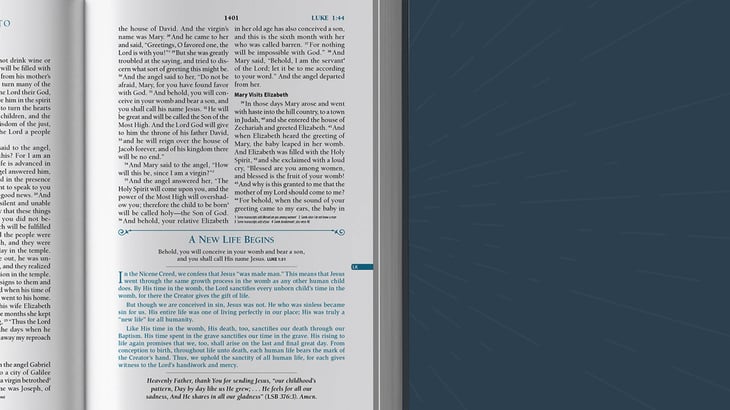Recent Posts by Adele Werner
Don’t Hurt Your Witness to Christ with Your Social Media Use
I’m a pretty active and avid social media user. I’m not a part of the generation that has grown up with social media all around, but I did get my first email account when I was 12. I used it to message my cousins and other close friends before I was allowed to get a Facebook account. I know the power of social media. I’ve seen it used for good as a means to fund a child’s dream or help a family down on its luck. I’ve seen communities form and friendships flourish. But I’ve also seen it create rifts. With such a powerful tool, sin enters. What is good can also sour.
We Christians know that when we witness to Christ’s resurrection and salvation, we do so with the help of the Holy Spirit. Therefore, we need to be aware that our social media use affects our witness. Here are three tips for making sure your social media posts are used for God’s glory.
Four Bible Verses on the Gift of Forgiveness
Have you ever fully thought about God’s forgiveness? About what it means that He has forgiven us?
I’m not good at forgiveness. I hold grudges. I say I forgive but then I don’t forget. I am not slow to anger and quick to forgive. In my sinful nature, I don’t want to forgive someone easily. They need to earn my forgiveness. I am so thankful that God’s forgiveness isn’t like mine.
Forgiveness is at the heart of our relationship with Christ. Through the forgiveness won for us on the cross, we are a part of God’s family. It’s an amazing gift that we receive through the Sacraments. Here are four verses to consider when thinking about God’s forgiveness toward us.
Four Bible Verses for Rejoicing Even When You Don’t Feel Like It
During hard times, it can be difficult to find the energy to rejoice. It feels easier to focus on how bad everything is and to dig in your feet and say, “Nope, nothing to be joyful about here.” I am frequently guilty of this. I often take a look at what is going on in the world and, instead of bringing my worries to God, I bury myself in how bad it is. In biblical times, there were many situations where believers could have lost all hope. But God’s promises break through and turn hard times into joy.
Prayer, Peace, and Pestilence: Psalm 91 and Today
Lately, a specific Bible passage has been popping up frequently for me. A note from a college friend, a post in a Facebook group, and a random opening of my Bible have all brought my attention to Psalm 91. I’ll be honest, the first couple of times I noticed people referencing it, I ignored it. I thought I’d look at it later; after all, there was too much to worry about for me to open my Bible. (Isn’t that always the excuse?)
But last night, I couldn’t sleep. I was tossing and turning and just wide awake. I finally decided that I had the time to read my Bible. And I knew exactly where I should turn to: Psalm 91.
5 Prayers to Use in Times of Turmoil
Times of turmoil can leave us shaken. We are reminded that we are not the ones in control. It teaches us that no day is guaranteed. But we can feel comforted knowing that Jesus is still on the throne. During this unprecedented time of canceled plans and, if we’re being honest with ourselves, panic around the world, spending time in prayer is very necessary.
Hope for the Worried
If you’re like me, you’re probably panicking a little bit right now. It feels like practically overnight everything went from bad to dangerous. I’m feeling very off-kilter, like I’m not quite sure what to do to move forward because I don’t know where forward is. I am a naturally anxious person, and so when it seems like the madness of the world has increased, I get worried. By that, I don’t mean I go out and panic-buy toilet paper, but I mean the pit I normally have in my stomach and the pressure in my head have grown. And without Jesus, I really don’t know how I’d cope.
Smaller and Smaller Churches: Evaluating Our Retention
My hometown church is small. It always has been. I started attending my junior year of high school, and at that time, it was already a pretty small congregation. But it’s smaller now, six years later. And I know we’re not the only church with this story.
You’ve Got a New Bible. Now What?
The past few months, I’ve been talking about new Bibles. From trying out a devotional Bible to gifting a Bible to someone, we’ve considered why finding the right Bible can enhance your walk with God. Now that maybe you have a new Bible in your hands or you’ve decided you want to continue using your current Bible, it’s time to delve into reading it. A new Bible or renewed vigor for reading the Word of the Lord is an opportunity to reevaluate your Bible-reading habits. But where do you start?
Considerations When Gifting a Bible
In three days, she would return to Germany. I was 16 and had become friends with a German foreign exchange student the year prior. She was back in the states for a month-long visit, and we were soaking up every little bit of time we had before she left and we would be back to not knowing if we would see each other in person again. Nicky and I were alike in many ways. We both were into theater, loved to sing, and were committed to what we set out to do.
During her first-round time in America, Nicky’s host family had taken her to church. Through her stay, she had become a Jesus-follower. When she returned to Germany, she got plugged into her local church and became a key part of their ministry. Again, our lives weirdly mirrored each other, as my life had also changed after a church invite.
So here we were in my bedroom, three days before her trip ended, and she handed me a wrapped gift. When I opened it, I started crying. It was a Bible.
Why a Devotional Bible Can Help Start a Bible-Reading Habit
I consistently remember to do my devotions but rarely think about going further into God's Word. It’s definitely a problem. I love that devotions center me on Christ, guide me through passages in Scripture, and help me apply the Word to daily living. But reading directly from God’s Word is incredibly important for growth. While I do my devotions regularly, I’ve wondered how I can use that practice to launch into deeper studying of the Bible.
Enter a devotional Bible. Why does a devotional Bible make it easy to remember to study the Word? Because it incorporates devotions (which I am already doing) directly with the Word.
Here are some suggestions for using a devotional Bible to enrich your Bible-reading routine:




















